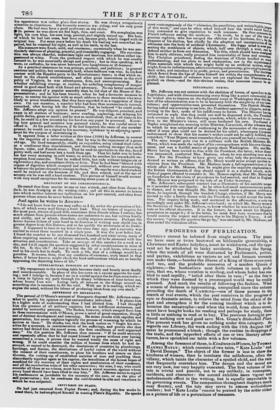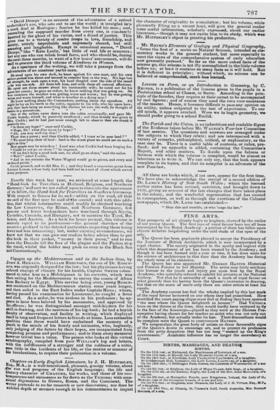PROGRESS OF PUBLICATION.
CONDUCT cannot be inferred from single actions. The praise we have once or twice bestowed on bibliopolic generalship, at Christmas and Easter holydays, must be withdrawn, and the apple rent art be attributed to lucky accidents. During the Spring, when the minds of all were distracted by Parliament, politics, and parties, exhibitions as various as art and human necessity can make them,—besides the illness of a King of three score years and ten, and the probable accession of a maiden Queen of eighteen,—the booksellers sent forth volumes in such profu- sion, that we, whose vocation is reading, and whom habit has enie bled to read rapidly, " toiled after them in vain ; " so the fate to which they were doomed by a preoccupied world may be readily guessed. And mark the results of following tho fashion. When a season of dulness is approaching, unequalled since the autumn preceding the death of CANNING—one of those pauses in the march of real events, which the poet contrives in the progress of epic or dramatic action, to relieve the mind front the strain of the past and strengthen it for the coming incident which is to de- termine the catastrophe—and when the world, from sheer ennui, must have bought books for reading and perhaps for study, there is little or nothing to read or to buy. The previous fortnight pro- duced nothing new and good save Mrs. GORE'S Stokeshill Place. The present week has given us nothing under this category. As regards our Library, the week ending with the 19th August 1837 must be pronounced a blank ; though the routine in-droppings of the trade, and the imperfect efforts of one or two literary adven- turers, have sprinkled out table with a few volumes.
Among the foremost of these, is Kindness in Women, by THOMAg HAYNES BAYLY; which consists of two tales, " Kate Leslie" and " David Dumps." The object of the former is le3s to show the kindness of women, than to inculcate the selfishness, often the villany, which taints the character of a spoiled child, and the rum that frequently overtakes him. The design and the moral are not very new, nor very happily executed. The first volume of the tale is trivial and puerile, not to say unlikely, in conception, incidents, and character : the second exhibits more vigour ad melodramatic effect in the writing, but is equally improbable la its governing events. The composition throughout displays much easy fluency, and the tale may serve to amuse unfastalious readers; but " Kate Leslie" cannot be praised by the critic either as a picture of life or a portraiture of manners. David Dutups is an account of the adventures of a retired undertaker's son, who sets out to see the world ; is inveigled into a mock duel at Boulogne; fancies he has killed his man ; and, concealing the supposed murder from every one, is constantly haunted by the ghost of his victim, and a dread of justice. This gives rise to a variety of contra temp in love, friendship, and
al 'ety utterly improbable and supremely absurd, but still se
"losing and laughable. Except in occasional scenes, " David Dumps," like "Kate Leslie,' has little of real life or manners ; but any one who can relish broad farce, and who should be, during the next three months, in want of a few hours' amusement, will do well to procure the third volume of Kindness in Women. As a specimen of the writing, we will take a passage from the adventures of an amateur yacht-man. He stood upon his own deck, he leant against his own mast, and his own sailors puPhed him about and seemed to consider him in the way. His legs lost all strength, he sank upon a seat, his head dangled over the side of the vessel _he was sea-sick. All fears left him, and with them all natural affections. He eared not three straws about his inestimable wife; he cared not for his guest her cousin; he gave no orders, he knew nothing that was going on. He was conscious the weather was getting worse and worse; but he was getting worse and worse himself, and what is weather to a dying man ? He knew nothing about the Commodore, nothing about the squadron. All i e ight he by on his berth n the.ealon, opposite to his wife, who lay upon hers; and, their beds being on something like shelves let into the wall, he thought of
• • bodies in a mausoleum. • - *
One of the sailors came down into the cabin occasionally, and gave Mr Cockle brandy, which he passively swallowed ; and then braudy wan given to Mts. Cockle; and he had Just sense enough left to observe that she drank it passively too.
6' Is there any hope?" once said Cockle. Hope, Sir ! what d'ye mean by hope? " Ali, you may well say that!" There was a pause; and then Cockle added, "I trust we're near land ?"
We must keep clear of land : land is the worst place we could see on such a n ight as this." How people mny he mistaken ! Land was what Cockle had been longing for. "Could we not go on shore ?" he inquired. "If we don't keep a good look.out, we shall go on shore," said the sailor. "Well ?" asked Cockle.
'Aid in ten minutes the Water-Wagtail would go to pieces, and every soul on Wald perish."
Coe'sle groaned, and so did Mrs. C. ; and they heard a responsive groan from Lorimer Lomax, whose body had been laid out in asurt of closet which served ninny purposes.



























 Previous page
Previous page